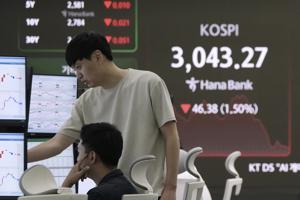
MANILA, Philippines (AP) — As the July 9 deadline approaches for the United States to finalize trade deals or implement higher tariffs, Asian markets displayed mixed performances on Wednesday. U.S. futures saw slight gains, while oil prices remained relatively stable. In Japan, shares initially dropped due to concerns over stalled trade negotiations with the U.S., but managed to recover some losses, closing 0.5% lower at 39,790.85.
Stephen Innes, managing partner at SPI Asset Management, noted the pressure exerted by President Donald Trump’s firm stance on tariffs.
“The message was blunt: if Tokyo won’t yield, it will pay. Tariffs of 30%, 35% or ‘whatever number we determine’ are now openly back on the table,” he said. “The negotiating table just became a pressure cooker.”
Asian Market Movements
Elsewhere in Asia, Hong Kong’s Hang Seng index climbed 0.8% to 24,271.15, while the Shanghai Composite index dipped slightly by 0.1% to 3,453.89. South Korea’s KOSPI experienced a 0.6% decline to 3,072.63 following a government report indicating a rise in inflation for June. Meanwhile, Australia’s S&P ASX 200 rose 0.8% to 8,605.40, and Taiwan’s Taiex edged up 0.1%. In contrast, India’s Sensex fell by 0.2%.
U.S. Market Dynamics
The U.S. markets displayed a mixed bag on Tuesday. The S&P 500 recorded a minor loss of 0.1% to 6,198.01, marking its first decline in four days. The Dow Jones Industrial Average, however, rose by 0.9% to 44,494.94, while the Nasdaq composite fell 0.8% to 20,202.89. Tesla’s shares dropped 5.3% amid ongoing tensions between its CEO, Elon Musk, and President Trump.
Their relationship, once amicable, has deteriorated, with Trump hinting at potential financial scrutiny on subsidies and contracts involving Musk’s companies. Tesla has seen a 25.5% decline in its value this year, largely attributed to this feud. The market also felt pressure from declines in stocks associated with the artificial intelligence sector, with Nvidia’s 3% drop significantly impacting the S&P 500.
Positive Trends Amid Challenges
Despite these challenges, some sectors showed resilience. Casino stocks rallied after reports of robust growth in gaming revenue in Macao, China’s casino hub. Las Vegas Sands surged 8.9%, Wynn Resorts increased by 8.8%, and MGM Resorts International rose 7.3%. Additionally, automakers excluding Tesla saw gains, with General Motors up 5.7% and Ford Motor climbing 4.6%.
Future Economic Implications
The U.S. stock market has rebounded impressively from a springtime sell-off of approximately 20%. However, the looming threat of Trump’s tariffs remains a significant concern. The potential activation of these tariffs could negatively impact the economy and exacerbate inflation. Concurrently, Washington is progressing on proposed tax cuts and other fiscal measures that might elevate the national debt, potentially leading to higher inflation and interest rates, which would affect bond and stock prices.
Despite these uncertainties, some analysts, including strategists at Barclays, observe signs of investor euphoria. They highlight a measure of “excess optimism” in the market, reminiscent of the peaks during the “meme stock” phenomenon and the dot-com bubble.
Global Economic Indicators
In early Wednesday trading, benchmark U.S. crude oil prices decreased by 8 cents to $65.37 per barrel, while Brent crude, the international benchmark, fell 3 cents to $67.08 per barrel. The U.S. dollar experienced slight gains against the Japanese yen, rising to 143.70 yen from 143.41 yen, and the euro declined to $1.1787 from $1.1808.
As the tariff deadline looms, global markets continue to navigate a landscape of uncertainty, with investors closely monitoring developments in U.S. trade policy and its potential ripple effects across the global economy.






